Trump’s travel ban cuts lifeline for Haitians facing security crisis
3 min read
Travel Ban Deepens Haitian Struggles
As President Donald Trump’s new travel ban comes into effect on Monday, Haiti finds itself among 12 countries reeling from the consequences. The Caribbean nation, already overwhelmed by violent gangs and dependent on international aid, now faces added isolation. The restriction is expected to further disrupt the lives of families and businesses with strong ties to the United States.
The ban prevents most new visa applications from being processed, unless strict exemptions are met. Though previously issued visas remain valid, this change effectively shuts the door on many Haitians hoping to escape worsening conditions at home.
Haitian-Americans Express Concern and Frustration
At Newark Liberty International Airport in New Jersey, Elvanise Louis-Juste, a Haitian-American resident of Florida, reflected on the situation with growing concern. “Haiti is not in the best shape as it was before,” she said on Sunday, waiting to catch a flight back home. “There are a lot of kidnappings, killings… it’s just really bad right now.”
She emphasized that the travel ban cuts off a vital lifeline for Haitians who view migration as a way to survive. “People need to escape to have the chance to live life, literally,” Louis-Juste added, noting how distressing it was to worry about loved ones still living in Haiti.
Muted Response in Haiti Amid Rising Fears
Despite the significant implications, there was no major rush at Haiti’s only operating airport over the weekend. Travelers heading to the US appeared reluctant to speak to journalists, fearing repercussions upon arrival in America.
Their caution highlights a growing climate of fear and uncertainty. While the US State Department clarified that the ban does not invalidate existing visas, new applications face steep odds unless applicants meet narrow exception criteria. Many see the move as a quiet but effective tool to reduce immigration without drawing mass attention.

Trump’s revised travel ban adds new barriers for Haitians seeking refuge from crisis back home.
Accusations of Racism Spark Anger Online
News of the travel restrictions prompted fierce backlash from Haitians across the globe. Social media platforms and local radio stations were flooded with angry messages, with many labelling President Trump’s decision as “racist.” Critics pointed to the inclusion of Haiti—alongside several predominantly African and Middle Eastern nations—as further evidence of discriminatory targeting.
The backlash echoed past controversies, including Trump’s infamous 2018 comments reportedly describing Haiti and African nations in derogatory terms. The new ban reignites that tension, especially in light of the ongoing humanitarian crisis in Haiti, which many believe warrants international support—not exclusion.
Wider Impact Beyond Haiti
Haiti is not alone. The revised proclamation also includes Afghanistan, Myanmar, Chad, the Republic of Congo, Equatorial Guinea, Eritrea, Iran, Libya, Somalia, Sudan, and Yemen. The breadth of this list signals the administration’s intent to maintain tight immigration controls while attempting to avoid the legal pitfalls of previous attempts.
CHECK ALSO| Police stakeout of Cameroon’s presidential hopeful ends
During his first term, President Trump’s initial travel ban faced swift and widespread condemnation for targeting mainly Muslim-majority nations. That order was eventually blocked by the courts. In contrast, the new version is more narrowly focused on the visa process and is crafted to withstand legal challenges.
Experts Say Ban Is Tactically Designed
Immigration analysts believe this new ban is legally sturdier than past versions. By concentrating on the visa screening process, the proclamation avoids overt language that previously fueled accusations of religious discrimination.

Trump’s revised travel ban adds new barriers for Haitians seeking refuge from crisis back home.
“The latest move is tactically clever,” one expert noted. “It’s designed to achieve the same outcomes—limiting immigration from targeted countries—without drawing the same judicial fire.”
A Lifeline Severed for Those in Crisis
For Haitians, this policy shift is more than a bureaucratic hurdle—it’s a devastating blow at a time when their country faces one of its worst crises in decades. The mix of political instability, rampant gang violence, economic collapse, and natural disasters has made the country nearly unlivable for many.
With borders tightening and humanitarian support dwindling, countless Haitians are left to wonder whether hope for a better future in the US is now out of reach.





